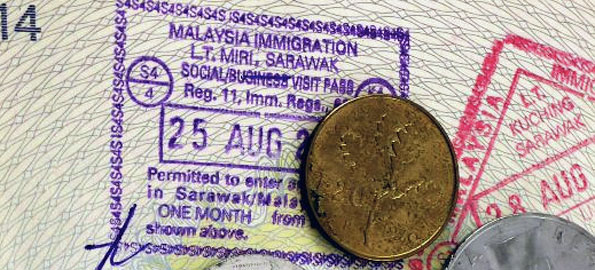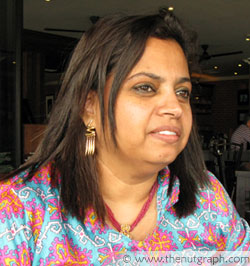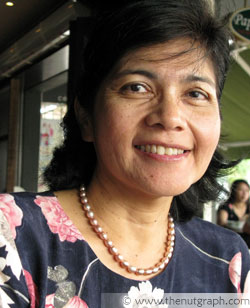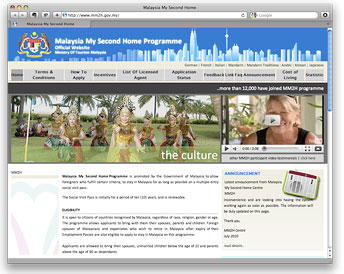
BINA Ramanand and Asha Lim are just two among what is believed to be many more with a predicament because they live in Malaysia. They are foreign spouses married to Malaysians who have waited years and in some cases, decades, for their permanent residency (PR) applications to be approved.
As of June 2010, the Home Ministry said 521 new applications were being processed by the Immigration Department. Between 2001 and 2009, the department also received and resolved 24,883 PR applications. What was not said, however, was whether “resolved” meant rejected or approved, and whether there were more pending applications that were made earlier.
Bina and Asha are behind the informal Foreign Spouses’ Support Group (FSSG). Bina, from India, has been in Malaysia for 18 years, and raised two children aged 16 and 11. She is still on a social visit pass. Asha, from Singapore, has lived here 28 years and raised three children aged 23, 17 and 16. Asha was recently issued an entry permit which is the interim document before she can obtain her PR or red identity card (IC).
FSSG began advocating for the rights of foreign spouses and children in 2007. It has teamed up with Wanita MCA, the MCA Citizenship Task Force, the Migration Working Group, and Women’s Aid Organisation to lobby for more streamlined procedures and to promote gender equality in PR and citizenship policies.
In an interview with The Nut Graph on 30 July 2010 in Puchong, they talk about the government’s arbitrary and discriminatory policies and its bureaucratic inefficiency. They also explain how this combination of government policy and inaction are hardest on non-citizen spouses from the lower income and non-professional group, and on spouses in abusive relationships.
TNG: What are some difficulties of living life here without PR status?

Bina Ramanand: We keep making repeated trips to the Immigration Department. We cannot hold well-paying jobs, do business, or study at the same fees that Malaysians pay. We find it difficult to open bank accounts in our own name. And we pay tourist rates at leisure and entertainment spots.
Without PR, we are treated like foreigners and not as part of our Malaysian families. We have to carry our passports around, while expatriates, foreign students and foreign domestic helpers get identity cards.
Without PR, we are unable to co-own property. We are subject to foreign investment rulings whereby there used to be a RM400,000 minimum restriction on property purchased by foreigners. Today, the restriction is lower. But it shows the bias towards wealthy or rich foreigners. Not every foreign spouse here lives like an expatriate. Nor is every foreign woman involved in vice as newspapers often depict.
Another aspect is health care. I once had the distressing experience of not being able to admit my child into emergency, because I am on a passport. As foreigners, we pay double charges at government hospitals and to deliver our Malaysian babies.
Having PR status is so important especially for estranged or divorced foreign spouses. A foreign wife has to have her husband as the sponsor for her PR application. If she wants to work, she requires a letter from her Malaysian spouse granting her permission to work. It is for want of this letter that estranged and widowed spouses are unable to get a work endorsement from Immigration.
But if she is separated or divorced, how is her husband going to sponsor her? How will she be entitled to work and to provide for her Malaysian family? Foreign wives without PR who suffer domestic violence are stuck with the abuse and are also vulnerable to deportation because they are at their husband’s mercy, unless they can find another sponsor with an income of above RM2,000.
What makes applying for PR so difficult? Please outline the hurdles for readers to get a fuller sense of what foreign spouses go through.
Bina: Let’s talk about what happens even before one qualifies to apply for PR. First, for foreign wives, you have to have lived here for five consecutive years. For foreign husbands, ten years. You live here as a spouse on a long-term social visit pass.
Asha Lim: The clock for the five consecutive years only starts ticking when Immigration issues you a one-year social visit pass, to be renewed for the next five years. The three-month or six-month pass you get when you first enter doesn’t count as part of the five years. It is time wasted. And during the five consecutive years, you cannot start the PR application process. You must wait until the five years are over. In other countries, foreign spouses obtain PR within the first five years.
Bina: After the five years, you may apply, but until we actually receive PR, our spouses have to be present with us at Immigration every time we renew our social visit pass. Our spouse has to take leave from work. And if you don’t have child minders, you bring along the children, so we go with crying babies in our arms and young kids to wait a whole day. It is very disruptive to family life.
To apply for PR, you submit numerous forms. They include copies of old passports of all members of the entire family and your wedding invitation. I had been married for 15 years, where on earth was I going to fish out the invitation from? They also want wedding photos as proof, birth certificates, education certificates, and more.
My experience includes being told to apply at the state immigration office of my husbands’ home address in his IC. So we went to the Perak immigration, where we were told to go back to Kuala Lumpur since the files had to be sent from Perak back to KL. Back in KL, at Pusat Damansara, we were told that the forms were out of print!

When your application is rejected, very often the reason is not given so one is clueless as to what is required. Further, many spouses do not receive the letter of rejection so they are unaware of the rejection.
I was informed in December 2009 that my application for PR has been approved. But I still have to wait for the letter for it to be official. To date, more than six months later, I still haven’t received the letter. It shouldn’t take this long to print a letter, should it?
So, basically, it is first a wait of five years to get the PR application form. After applying, there’s another long wait for approval, then another wait for the official letter, followed by another wait for the entry permit, which you need first in order to get PR or the red IC.
What is the process like if a foreign spouse wants to work?
Bina: On my current social visit pass, I have an endorsement to work from Immigration. To get it, one needs an appointment letter from the employer, and a letter from our Malaysian spouse giving us permission to work! I am not sure how they apply this to foreign husbands married to Malaysian women.
Up until October 2008, foreign spouses could only work in companies which had a paid-up capital of RM250,000 and above. Not all foreign spouses are professionals and some of them just want to supplement the family income. This restriction has [since] been removed and this has helped to make finding work a bit easier.
But it remains difficult especially for estranged or divorced foreign spouses. I have come across a case where an employer wanted to help a widowed foreign spouse with a child and the employer got remanded for hiring a foreigner without a work permit. Who would want to employ a widowed spouse and how is she supposed to care for her Malaysian children or dependents such as in-laws?
But in this case the widow has since been informed that [the Home Minister has given her a special approval], so it is heartening that such cases come within the minister’s purview.
It is far easier and faster with an expatriate visa and even for domestic helpers to renew their work permits.
Many of us who are still waiting for PR came here in the late 1980s and early 1990s. We have lost the prime of our lives and missed opportunities for work while waiting. In the end, it is our Malaysian families who are deprived of a better standard of living.

Asha: Many foreign spouses I know do charity or volunteer work while waiting for PR status to find better employment. But even if we don’t work, we are still contributing to the local economy. As caregivers and homemakers, we are freeing up our Malaysian husbands to work and contribute to the economy.
Why can’t foreign spouses here be measured for the value they bring to Malaysia? We act as ambassadors for Malaysia to our extended families; we bring in tourism dollars when our relatives come to visit us. We bring our funds and savings from our countries of origin to contribute to our families and the economy here.
Are there differences in the problems for male and female foreign spouses?
Bina: Yes indeed, male spouses have problems too. The 10-year requirement for continuous residency before they can qualify to apply for PR being one of them. In some cases, applications by foreign husbands are rejected right away while foreign wives are given more consideration.
The non-citizen husband has additional requirements to fulfill to get a social visit pass that doesn’t apply to a foreign wife. These include proof of a minimum of six months of marriage, and proof of employment, or of a sponsor who earns above RM2,000.
The conditions for citizenship for foreign wives are also not extended to non-citizen husbands of Malaysian women. Husbands need to continuously reside here for another 10 years, or 20 years in total, just to apply for citizenship. For non-citizen wives it is a total of seven years continuous residence, according to Article 15(1) of the Federal Constitution.
Our support group consists largely of wives. I think many foreign husbands find the wait too long and uncertain and it is easier to take their families and leave.
Has anyone ever given you a reasonable explanation as to why the government is so slow in handling applications?
Bina: Shouldn’t this question be answered by the leaders, probably they have a reason for this policy?
The beneficiaries of foreign spouses are their Malaysian families and the country. Income earned by foreign spouses will be spent in the country on property and other assets that will remain in the country and promote economic growth. I sold my property in India to buy property in Malaysia.
If you add the human aspect and the number of Malaysians who are impacted, shouldn’t foreign spouses be at the top of the list to receive PR?

If you talk about brain drain, I personally know more than 20 people who have left the country who were mostly professionals, doctors and engineers, because the policies were really difficult on their spouses.
We are always told that PR is a privilege and not a right. But it seems this privilege is fast-tracked for foreign professionals, and now even top-performing international students. Other foreigners who come under the Malaysia My Second Home programme are also treated better. Perhaps the new policy on highly-skilled foreigners should also include foreign spouses. Due consideration should also be given to homemakers and unskilled workers.
How could policies and guidelines for PR and citizenship applications be made clearer? In what other ways could the Immigration Department improve the process?
Bina: There has to be clear cut policies and guidelines with clearly spelt out time frames so that foreign spouses and their children are not at the mercy of the immigration officers and their individual interpretation of the law. Each visit to Immigration is traumatic, one never knows what to expect and the rules keep changing.
As a signatory to the Convention on the Elimination of All Forms of Discrimination Against Women (Cedaw), we hope the policy with regard to PR applications can be streamlined so as to enable spouses and their Malaysian families to enjoy a stable family life. ![]()
[related-posts]
The Nut Graph needs your support


julian says
I am the male spouse of a Malaysian woman. I have lived here for more than seven years, of which four was spent teaching at Malaysian college students, and now I am doing a PhD locally where I continue to pass on knowledge to local students, as well as contribute to the important education industry.
I paid taxes and contributed to Malaysian society. I only recently discovered that these seven years will count for nothing because I have not been here under a social visit pass (“The clock for the five consecutive years only starts ticking when Immigration issues you a one-year social visit pass”).
I wanted to switch to one when I started doing the PhD, but was told that I could not be a student while on a ‘Spouse visa’ (i.e. the one-year social visit pass).
Due to bureaucratic delays, I have twice been told to leave the country within 24 hours, once within 12 hours. As it stands, I am facing at least eleven years before I can have some assurance of stability and security of residence here. I have a child, but face the possibility at any time of being refused permission to live here.
Jacob says
You’re in a power of s–t. If you are getting your Ph.D from a local university it won’t be recognised overseas so you won’t be able to use it back home.
You’ll have to work here but you can’t until you get your PR, which in all probability won’t happen.
Move back home. Cut your losses now.
I’ve also been here over 7 years, married a Malaysian with 4 kids. I’m studying a trade with a British company and then poof, we’re gone.
Stuff you, Malaysian Government. Thanks for nought. Will be telling the world how wonderful you are not.
amber says
I know this is not relevant but related. West Malaysians have problems settling down in East Malaysia too.
My family has been living in EM for the past decade and more, and we still have to visit the Immigration Department. My dad is trying to apply for PR but so far still waiting for good news. You’ll face harder times finding a job as you’re not East Malaysian.
ShaolinTiger says
Yah I face similar problems, I don’t understand why they feel the need to introduce so much bureaucracy to the process and make it so complicated.
The fact is, as Julian states, we contribute to the economy, the knowledge pool and we pay taxes just like anyone else.
We spend our money here, we don’t send it overseas to our families so why are we discriminated against?
Surely if we are valuable all over the World (I could easily work in the UK or US and get a PR without much problems in Australia) – Malaysia should be making more of an effort to retain us rather than pushing us to uproot and take ourselves and our families elsewhere.
As I’m also on a Employment Pass visa, I face a long wait until I’m even ‘qualified’ to apply for PR status.
It’s a sad state of affairs, even though the government has recently made some announcements regarding giving PR to ‘skilled expats’ everything is still extremely vague, there is a distinct lack of information on the Immigration website and honestly we all still have no idea where we stand.
rob says
As a foreigner I’m now on my second Malaysian wife, the first a bumi. But no luck. In response to Amber, can understand why Sarawak doesn’t allow carpet baggers from West Malaysia to come here. If they did there would be nothing left for Taib to rip off. I’ve basically given up ever getting PR. Will try instead for the Grey Haired scheme… Inshallah, that will work.
Little Woman says
I just recently married my husband, a Canadian citizen who stays with me now right here in Malaysia. Thus long, we’ve only been thinking of renewing his visa every few months, giving us a chance to get out of the country for some fresh air. But of course, with my income, we cannot afford to do too many things. What can we do? I can only hope that in the near future I can start my own business, pull him in as a business partner and get another person to sign with us, and get him an Employer Visa. Hoping for a PR? No, we lost hope after reading the plights of so many others who have been here for years. He’s already in his 40s. Wait another 20 years for PR? I’d have retired by then, and maybe we would have moved to Canada instead.
Gina says
This is indeed a ridiculous situation that these women find themselves in. But a couple statements leave me wondering. I am a foreigner here on a tourist pass. I basically live here (my home is here) but I travel so much that my lack of visa doesn’t attract attention. So like these women I am here on a passport.
(1) I have never had trouble admitting myself or my child to the emergency room. I’m never asked for a passport or a residency card.
(2) I own property here. You don’t have to have a residency card to own or co-own property in Malaysia. You don’t even have to live here. I bought property in Malaysia before I settled here.
(3) A friend is the spouse of an employed expat. She is not entitled to a residence card, only he is. She also must use a passport as these women do.
Again — I’m supportive of efforts to get the Malaysian govt to iron out the bureaucracy involved in granted PR to foreign spouses. But let’s not overstate what these women (and men) have to deal with.
ShaolinTiger says
“(2) I own property here. You don’t have to have a residency card to own or co-own property in Malaysia. You don’t even have to live here. I bought property in Malaysia before I settled here.”
Correct, but there is a financial imposition as stated in the article. It used to be a minimum of RM350,000 but last September 2009 was changed to RM500,000. This is enforced both both outright ownership by a foreign party or co-ownership. I know because it was enforced on me
Maya says
Gina, perhaps you are on MM2H, with a card for healthcare/hospitalisation.
These spouses have had real life experiences, without medical insurance.
Sometimes it depends on the attending desk officer/receptionist, they are at their mercy.
Double charges at government hospitals for foreigners irrespective if you are a spouse of a Malaysian.
As said the ceiling on purchase of property by foreigners differs from time to time as per the FIC ruling.
Until 2008, all foreign spouses had to work on an employment pass. It was called the spouse programme with the restriction of having to work in a company with a paid up captial of RM250,000.
Currently even spouses of expats can work. Perhaps that’s why the allowance was given to foreign spouses??
Different rules for different folks perhaps??
Meenakshi says
I am a Malaysian citizen married to an Indian and we live in Bangalore. Both of us are working in MNCs . After hearing of the difficulties faced by foreign spouses, I feel it is better for me and my husband to remain in India. Here, there are no problems with a foreign spouse working, and I have the same status as any other Indian.
Lainie Yeoh says
I can’t imagine any locals marrying foreign spouses would want to subject their partners to the unavoidable incompetence that is our bureaucracy.
Anonymous Coward says
Our bureaucracy is on par with the Vogons’.
Aditya Mohan says
I am Indian professional who married my wife in 2001 and have had an employment pass since then. I will be completing 10 years of stay in Malaysia in one year’s time in 2011. You mean I cannot apply for PR after 10 years’ stay because I am on an employment pass and not on a social visit pass?
NeelimaGandham says
I am an Indian citizen, married and living in Malaysia for 12 years. I did my Masters in Anaesthesia in University Malaya. Every year going through Immigration for a Work/ Spouse visa is gruesome. Whenever I decided to take a few months break from work, I was made to convert my work visa to Social Visa and then re-apply for a work permit when I start back again. And this involves endless paperwork and queues at the Immigration building with the whole family as evidence.
I have now moved to Australia and really proud to be an Australian by right. I am respected for my profession and so is my Malaysian family living with me. Throughout my stay here, not once did I have to queue up at the Immigration.
Neelima Gandham
izella says
What’s betting that if you were to make a survey, Muslim applicants do not face the same run-around? Or if they were married to Malay Muslims? What I’ve read above leads me to that conclusion and being in boleh-land why should that be a surprise? Face it you guys, you’re just tolerated and not welcome to stay for good.
Jacob says
Izella – two of my best friends married Malay women, both of whom met their partner while studying overseas. One is Canadian, the other American.
Neither of them has any advantage over me, who married a Chinese Malaysian. They’ve also been here more than 7 years, have 2 and 3 kids here respectively and grown roots.
They are as far from getting a PR as I am. Whites are just not welcome here.
Sean says
We’ve just renewed my visa in Seremban. They usually ask how long we want, there’s an argument over six months or 12 months, and then when we go back to pick up my passport, we usually make an attempt for another six months. This time was different. We were told we could ask for more, so asked for two years. We went back to pick up my passport and was told I could have three years! We decided sometime ago that 2012 was our cutoff date for “something amazing to happen”, and our benefit of the doubt is all eroded, so we turned down the three years for the cheaper two.
We first heard about the prospect of a five-year spouse visa three or four years ago, and Seremban always said “not here” when we enquired. Perhaps there is some improvement.
manju says
My hubby’s now working overseas and I went to immigration for a visa extension. They asked my husband to come. My husband can’t come here for another two years so I have to leave the country without extending my visa and my five years efforts are gone, what should I do? Really pathetic.
Siti says
Manju, try going back to immigration and ask to see the director. I did before over my maid and they were very helpful.
My husband is American. On first entry, he was given a 3 mths visa. After we got married in KL he was given a 6 mths, then a five yr long term pass. We had to visit the immigration office several times but that was because we didn’t have the appropriate documents. Once we submitted all the docs, we were given the 5 yr pass the following day.
With regards to medical costs, my husband pays rm1 at government hospitals, just like my fellow Malaysians. All he needed to do was show our marriage cert at the hospital counter. My brother’s wife is Filipino, she paid RM10 at the Tawau govt hospital when she delivered my nephew!
kalaivani sivakumar says
I am an Indian. Married a Malaysian. If I apply for PR, is there any rule that I should not stay more than 30 days in India?